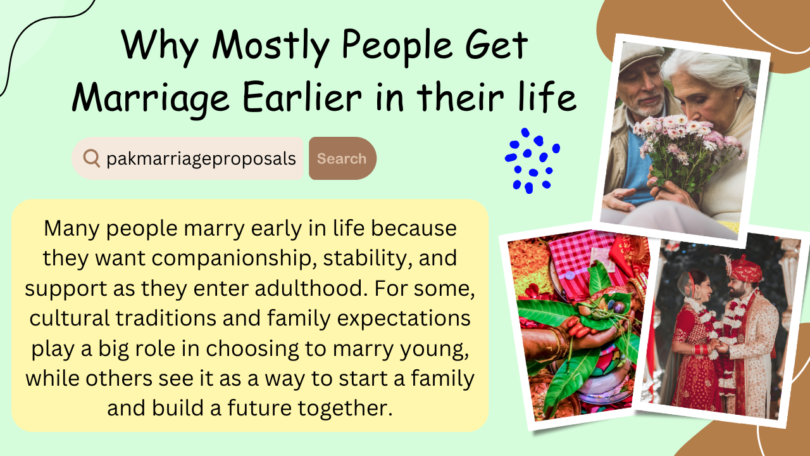Many people get married early in life because they want to share their life with someone special. Marriage can bring companionship, support, and a feeling of stability, which can be comforting as people start their adult lives. In some cultures, marrying young is a common tradition, and families encourage it as a way to meet social expectations. Some people also feel that marrying young gives them a chance to start a family and build a stable life together. lets read about People Get Marriage Earlier
Understanding Early Marriage
Early marriage refers to individuals getting married in their early 20s or sometimes even in their late teens. The decision to marry early is influenced by a range of factors such as societal norms, emotional readiness, financial considerations, and personal goals. Let’s dive deeper into the reasons why most people get married earlier in life.
1. Cultural and Societal Expectations
Traditional and Religious Beliefs
In many cultures and religions, marriage is viewed as an essential milestone that should occur early in life. These traditions encourage young adults to marry sooner, often believing that it strengthens family ties, ensures continuity of values, and supports communal harmony.
Marriage Age in Different Cultures
| Country/Region | Average Age for Marriage |
|---|---|
| India | 22-25 years |
| Middle East | 20-24 years |
| Sub-Saharan Africa | 18-22 years |
| Latin America | 23-26 years |
In regions where traditions and customs play a vital role in daily life, early marriage is often seen as fulfilling religious duties and societal expectations.
Pressure from Family and Society
Family plays a significant role in encouraging early marriages, especially in societies where family reputation and continuity are prioritized. Parents may believe that early marriage provides security and stability for their children, especially daughters.
2. Emotional and Relationship Factors
Desire for Companionship
One of the most common reasons people marry early is the desire for a deep emotional connection and companionship. Marrying at a younger age allows couples to grow together, share experiences, and support each other during the formative years of adulthood.
Romantic Love and Commitment
For many young people, falling in love and the desire to solidify that relationship through marriage leads to early weddings. When couples feel emotionally connected, they often believe that early marriage will secure their love and commitment.
Building a Family Together
Young couples often want to start a family early so they can experience the joys of parenting at a younger age. Early marriage provides the opportunity for couples to have children and raise a family while they are still young and active.
3. Financial and Economic Considerations
Economic Stability and Support
In some cases, early marriage is seen as a way to achieve financial stability, especially when both partners are contributing to the household. By pooling resources together, young couples can better manage expenses like housing, education, and savings.
Economic Advantages of Early Marriage
| Financial Benefit | How It Helps |
|---|---|
| Shared Income | More financial security for young couples |
| Early Homeownership | Start building equity earlier in life |
| Financial Planning | Longer time for savings and investments |
Dowry and Economic Arrangements
In some cultures, financial incentives like dowry (money or property brought by a bride to her husband upon marriage) or similar economic agreements encourage early marriages. This financial support may make marriage more attractive for families who seek stability for their children.
4. Biological and Health Reasons
Peak Fertility Years
From a biological perspective, fertility peaks in the 20s for both men and women. Many people choose to marry early to take advantage of this natural fertility window, which makes conceiving children easier and lowers the risk of complications during pregnancy.
Fertility Rates by Age for Women
| Age Range | Fertility Rate |
|---|---|
| 20-24 years | 86% |
| 25-29 years | 78% |
| 30-34 years | 63% |
| 35-39 years | 52% |
Marrying early allows couples to have children during their most fertile years, ensuring healthier pregnancies and more energy to raise children in their younger years.
Longer Time for Raising Children
Getting married at a young age gives couples more time to raise children and watch them grow. It also means that they will still be relatively young when their children reach adulthood, allowing them to enjoy life beyond child-rearing.
5. Personal and Career Growth Together
Growing Together
For many couples, early marriage means growing together as individuals and as a partnership. Rather than waiting to achieve personal or professional goals before marrying, they choose to pursue these goals side by side. This shared journey fosters stronger bonds and mutual understanding over time.
Supporting Each Other’s Career
When couples marry young, they have the opportunity to support each other’s career aspirations. They can make decisions that benefit both of their professional growth, whether that means moving for a job opportunity or sharing financial responsibilities to allow one partner to study or work.
Benefits of Career Growth in Early Marriage
| Benefit | How It Helps |
|---|---|
| Joint Financial Planning | Better management of long-term goals |
| Work-Life Balance | Balancing career and family responsibilities |
| Professional Networking Together | Supporting each other’s career ambitions |
6. Emotional and Psychological Maturity about People Get Marriage Earlier
Early Emotional Maturity
While some may argue that young adults are not yet fully mature, early marriage can actually promote emotional growth. Sharing life with a partner at an early stage helps individuals develop emotional intelligence, problem-solving skills, and resilience. Young couples often learn how to communicate better, resolve conflicts, and grow emotionally as a unit.
Taking Responsibility Early
Marriage involves a significant level of responsibility, and for those who marry young, these responsibilities are embraced early. This can lead to better decision-making, enhanced time management, and stronger leadership skills, both in the home and in the workplace.









Leave a Comment